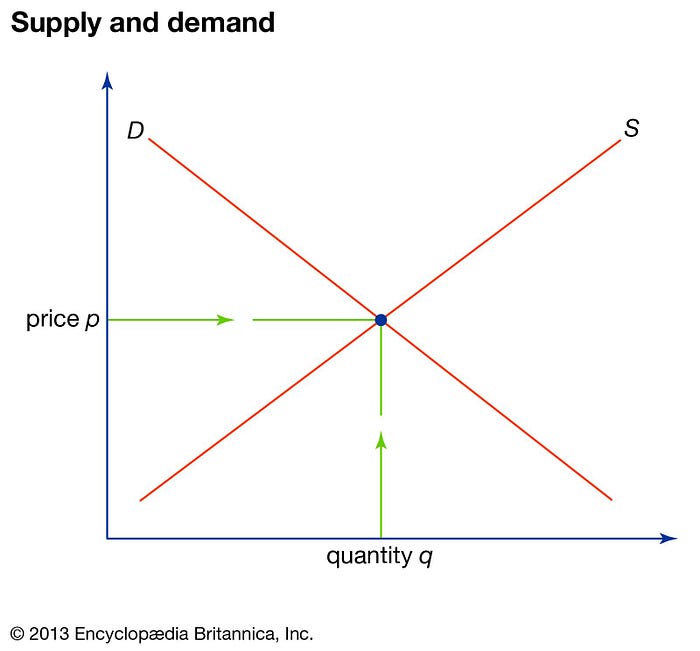The Fundamental Flaw of Libertarianism
A Presidential Candidate Says the Quiet Part Out Loud
Like many middle-class white kids studying Business, I went through a libertarian phase in college. This ideology initially appealed to me because of the American Patriotism and Protestant Work Ethic instilled in me by my parents. I had obviously been born into the Greatest Country in the History of the World, one in which anyone who worked hard would succeed. People who complained about having a less fortunate upbringing were making excuses because they didn’t want to work. The government had ostensibly good motives for taxing the rich to provide welfare to the poor, but this only discouraged hard work and took money from the people who best knew how to use it.

On the flip side, I was also beginning to question many aspects of my upbringing. Specifically, I was going through the process of deconstructing my fundamentalist Christian and Conservative beliefs. I was warming up to the idea that the government shouldn’t intrude on people’s personal lives. I was cool with gay marriage, against foreign wars, and (like my fellow Libertarian business classmates) believed in the right to smoke as much weed as I wanted. Ultimately, I wanted one thing: Freedom. Freedom of Speech, Freedom of Expression, Freedom of (and from) Religion, and Freedom to make (and keep) my own money. Government should only be in the business of protecting property rights: everything else was overreach.
I soon entered the real world and grew out of this phase. I realized the American Dream was largely a myth, that McDonald’s employees often worked far harder than guys like me with cushy office jobs. Perhaps more importantly, I learned that countries with large social safety nets (read: Welfare States) had much higher quality of life, reported levels of happiness, and even freedom. Objective historical and contemporary analysis proves that private, for-profit healthcare services and fire departments are far inferior to their public counterparts. We also know the Libertarian ideal of tax cuts leading to “Trickle Down Economics” has never worked.
Despite all this, Libertarianism never stopped appealing to me, at least at a theoretical level. I opposed Libertarianism in practice because some things empirically worked better under a public system, but I still shared their skepticism of government. Until recently, I had a difficult time resolving this contradiction. There always seemed to be a disconnect between my support of government-run programs like Universal Healthcare and Education, and my distrust of that same government. Sure, I also distrusted corporate authority and privatization, but why did the government stepping in make things better?
My lightbulb moment finally came from listening to the Krystal, Kyle, and Friends podcast, specifically their interview with Libertarian presidential candidate Mike ter Maat. During a somewhat heated exchange around government regulations, Krystal argues that it makes sense for “many of these things to be done at the governmental level, where you have the input of citizenry on societal goals that may be separate and apart from the profit motive.” In response, ter Maat exposes the core flaw in Libertarian ideology:
“[While] a regulatory framework may be a good idea…that framework doesn’t necessarily need to reside with an elected, democratically fostered institutional government.” (emphasis added)
Libertarians rarely attack Democracy specifically, instead arguing that government in and of itself is oppressive. And they have many, many examples backing up their argument. Of course Hitler was bad! Of course Stalin was bad! But they were only able to commit atrocities through the system of an oppressive, tyrannical government. Therefore, limiting their power was necessary. And of course, it’s not only authoritarian governments that have problems: even the most liberal democracies on Earth suffer from widespread corruption. How could you not agree with shrinking the size and influence of government!?
Here’s the thing: each of the examples above illustrates the failures of governments that are not beholden to their people. Hitler and Stalin were dictators who completely removed the democratic process in their rise to power. But even in nominally democratic governments, politicians often don’t serve their constituents. Some examples:
- Politicians who own corporate stock, then pass laws that directly affect the prices of these stocks.
- Politicians who take money from large companies, then do their bidding (even sitting on the boards of these corporations after finishing their “service”).
- Politicians who make deals that benefit foreign countries, then directly receive business deals from these countries that personally benefit them!
Of course, we have a word for this: corruption. In a democratic government, corruption occurs when elected officials represent Monied Interests over the will of their voters. The majority of Americans want Universal Healthcare, free college, and legal weed. But healthcare companies, the private school lobby, and Big Pharma don’t. These are all perfect examples of government turning away from the democratic will of the people and towards an Oligarchy of the wealthy elite.
So what can we do to hold our politicians accountable? How can we trust the government to pass laws to regulate itself? Wouldn’t shrinking the size of government help solve some of these problems? These are all valid questions that, quite frankly, I don’t have great answers to. What I want to stress, however, is that Libertarians don’t either. When they call for “small government”, they typically mean making the government more corporate-friendly, and by extension, less democratic. For instance, reducing or eliminating regulations is not a democratic way to reduce government.² Businesses should be accountable to their workers and the people residing in the towns where they operate. Allowing corporations to make decisions about how much they’re going to pollute without any oversight from the people is terrible policy, and quite frankly, authoritarianism. Libertarians are fine with this, as long as the authoritarianism is coming from private industry and not the government. Their problem with government, therefore, is not authoritarianism per se, but often with democracy itself. My problem with it is the exact opposite.³
I’ll leave you with this: Libertarianism was initially a left-wing ideology. In fact, some people consider themselves Libertarian Socialists, a term that probably sounds contradictory. Libertarianism, however, is ultimately just the belief that the government shouldn’t take away personal freedoms from individuals, as long as these freedoms don’t interfere with the freedoms of others. You want to marry someone of the same sex? Go for it! Doesn’t affect me! You want to do drugs in the privacy of your own home? Suit yourself, just don’t get behind the wheel or sell to my kids! This part of Libertarianism still appeals to me. I may not personally approve of all your life choices, but if it doesn’t hurt anyone else it’s none of my (or the government’s) business.
The problem is that Right-Wing Libertarians have conflated these personal freedoms with the “freedom” of Oligarchs to tread on you. The minute you walk into work, your freedom is gone, superseded by the freedom of your boss to tell you what to do. Do safety or environmental regulations really restrict your “freedom?” Perhaps if you’re the CEO of a large company, but certainly not if you’re a worker with a dangerous job or a resident directly affected by corporate pollution. Oligarchs hate “Big Government” because they want the “freedom” to exert unwanted influence over your life. These are exactly the types of “freedoms” true Libertarians should be opposed to. Most Libertarians would agree that you don’t have the freedom to murder someone. Yet, they’re perfectly fine with the freedom of corporations whose actions directly lead to the deaths of others. This irony shouldn’t be lost on anyone.

I am proud to call myself a Libertarian Socialist, which I consider the most pure form of the ideology. I don’t want your freedom going out the door the minute you walk into work, and I don’t want Oligarchs having the freedom to run society without our say. I want more democracy in the voting booth and the workplace. Tyranny is bad whether in the corporate world or the political one. “Libertarians” oppose any system of government that gives the people a say over the actions of the wealthy elite. I oppose any form of government that restricts your freedom for the benefit of this same elite. I think it’s obvious which version is more conducive to “Liberty”.
1: Yes nuance trolls, technically it would be “free at the point of service”. Literally everyone knows this would be funded through tax dollars, and they still support it.
2: I want to make it clear that I am not saying ALL regulations are good. Regulations are sometimes not well thought out and occasionally lead to larger problems than the ones they are trying to solve. However, the solution to this problem is not the elimination of regulation, but rather more democracy in their implementation.
3: Unions are another great example of this. Libertarians hate unions because they give workers real power in their relationship with their companies. Unions provide workers with an actual say in the direction of their company (something that at least resembles Democracy). This interferes with the world of corporate tyranny that many Libertarians want.
